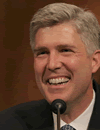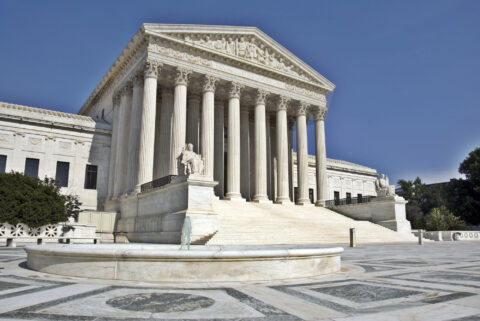Hon. Raymond Gruender
United States Court of Appeals for the Eighth Circuit (June 5, 2004-Present)
Summary
We found five cases where Judge Raymond Gruender participated in an opinion related to free speech rights. He supported First Amendment speech rights in four of the five cases.
- Minnesota Citizens Concerned for Life, Inc. v. Swanson, 692 F.3d 864 (8th Cir. 2012) (en banc) (Gruender, J., joined the majority opinion).
This is the most important of the five opinions, by far, and is one of the most important pro-free speech circuit court decisions of the last five years. As noted in the opinion, “Minnesota has, in effect, substantially extended the reach of PAC-like regulation to all associations that ever make independent expenditures…. Allowing states to sidestep strict scrutiny by simply placing a ‘disclosure’ label on laws imposing the substantial and ongoing burdens typically reserved for PACs risks transforming First Amendment jurisprudence into a legislative labeling exercise.” The majority found that the law failed even exacting scrutiny.
- Wersal v. Sexton, 674 F.3d 1010 (8th Cir. 2012) (Gruender, J., joined Judge Colloton to dissent in part).
Judge Gruender joined Judge Colloton’s dissent from the en banc opinion. Applying strict scrutiny, it found that the “endorsement clause” and “personal solicitation” clause of Minnesota’s Code of Judicial Conduct were unconstitutional.
- Minnesota Majority v. Mansky, 708 F.3d 1051 (8th Cir. 2013) (Gruender, J., joined the majority opinion).
Judge Shepherd wrote separately to dissent in part. His opinion was thoughtful and strongly supportive of First Amendment free speech rights. Unfortunately, Judge Gruender did not join this dissenting opinion.
- Republican Party v. White, 416 F.3d 738 (8th Cir. 2005) (en banc) (Judge Gruender joined Judge Colloton’s concurrence.)
Judges Gruender and Colloton and one other judge concurred in portions of the opinion and the judgment of the court. In this case, the court found that the “partisan-activities and solicitation clauses [of the Minnesota Supreme Court’s canons of judicial conduct] also violate the First Amendment.” Earlier, the U.S. Supreme Court had invalidated the “announce” clause and remanded the case for review of these two other provisions.
- St. Paul Area Chamber of Commerce v. Gaertner, 439 F.3d 481 (8th Cir. 2005) (Gruender, J., joined the majority opinion).
This case involved “three chambers of commerce operating as nonprofit corporations in Minnesota” that challenged the state’s ban on corporate contributions, even in certain situations in federal election campaigns. The groups argued that the law was “unconstitutional and preempted by the Federal Election Campaign Act … to the extent that the Minnesota Statutes pertain to federal elections.” The panel reversed the district court, which had dismissed the case “on the ground that [the chambers] lacked standing.” This ruling recognized a law that chills speech creates an injury necessary to create standing and that the fear of prosecution in this instance was reasonable.
Full Report
Minnesota Citizens Concerned for Life, Inc. v. Swanson
As we noted with our previous report on Judge Steven Colloton, also of the Eighth Circuit, the most significant of these decisions, by far, is Minnesota Citizens. The opinion strongly favored First Amendment free speech rights, and Judge Gruender joined the majority.
After Citizens United was decided, Minnesota passed a law requiring corporations (including nonprofits) wishing to speak out on political candidates to create “political funds” similar to PACs. A group of incorporated entities challenged both that requirement and Minnesota’s ban on corporate contributions to candidate campaigns, and sought an injunction against enforcement of the law.
The Eighth Circuit heard the case en banc – meaning that the case was heard by all active circuit judges, and not merely a three-judge panel. A majority found that appellants would likely win on the independent expenditure issue, but fail in their challenge to the contribution ban.
The majority opinion concluded that “Minnesota’s campaign finance laws unconstitutionally infringe upon the right to engage in political speech through independent expenditures.” The majority found that, even under exacting scrutiny, the burdens imposed by requiring speech to be conducted via political funds and the attendant disclosure and reporting requirements were likely unconstitutional.
Here are key excerpts from the majority opinion:
Minnesota’s law provides two options for corporations and limited liability companies to participate in making independent expenditures…. Both options require compliance with certain organizational, record-keeping, and reporting requirements. Importantly, these laws reach not just corporations and limited liability companies, but nearly all associations…. [Emphasis in original.]
First, an association may indirectly make an independent expenditure “by contributing to an existing independent expenditure political committee or political fund….”
For an association directly to make an independent expenditure, it must create and register its own independent expenditure political fund (political fund). Once an association forms a political fund, it must elect or appoint a treasurer and ensure the contents of the fund are not commingled with other funds [and file regular reports with the state regardless of whether it participated in political activity]….
[Reporting requirements were triggered by expenditures of as little as $100.]
Minnesota’s law imposes virtually identical regulatory burdens upon political funds as it does political committees. This equality of burdens is meaningful in view of past judicial efforts to ensure laws imposing PAC status and accompanying burdens are limited in their reach….
By subjecting political funds to the same regulatory burdens as PACs, Minnesota has, in effect, substantially extended the reach of PAC-like regulation to all associations that ever make independent expenditures. [Emphasis in original.]
The Supreme Court has recognized forcing a corporation to speak through a PAC creates “First Amendment problems” because of the associated regulatory burdens….
In Citizens United, the Supreme Court characterized PACs as “burdensome alternatives” to direct corporate speech because “they are expensive to administer and subject to extensive regulations.” The Supreme Court highlighted requirements substantially similar to those Minnesota imposes upon political funds. The Court surmised these “onerous restrictions” likely stop many corporations from speaking through PACs. We surmise the same is true of Minnesota’s expansive regulation of political funds.
Perhaps most onerous is the ongoing reporting requirement. Once initiated, the requirement is potentially perpetual regardless of whether the association ever again makes an independent expenditure….
Suppose two Minnesota farmers owning adjoining property near a highway support a particular candidate for state office. The farmers decide to erect a large sign in support of the candidate and spend over $100 in supplies and labor. To comply with Minnesota’s law, the farmers must create and register a political fund, appoint a treasurer, keep detailed records, and file ongoing reports with the Board. The farmers must continue to file even if the farmers do not continue to “speak.” To escape these ongoing burdens, the farmers must file a termination statement. Before they can do that, they must dispose of the political fund’s assets – including the sign. If the farmers forget to file, or assume continued reporting is unnecessary, they are subject to significant fines and possible imprisonment.
Faced with these regulatory burdens – or even just the daunting task of deciphering what is required under the law … the farmers reasonably could decide the exercise is simply not worth the trouble. And who would blame them? … In short, the collective burdens associated with Minnesota’s independent expenditure law chill political speech.
This chill is more than a theoretical concern. All three appellants – two nonprofit issue advocacy groups and one for-profit travel-services provider – claim to have abandoned planned independent expenditures in order to avoid the accompanying regulatory burdens….
The district court characterized the challenged provisions as a disclosure law and accordingly determined exacting scrutiny was appropriate. We question whether the Supreme Court intended exacting scrutiny to apply to laws such as this, which subject associations that engage in minimal speech to “the full panoply of regulations that accompany status as a [PAC].” Allowing states to sidestep strict scrutiny by simply placing a “disclosure” label on laws imposing the substantial and ongoing burdens typically reserved for PACs risks transforming First Amendment jurisprudence into a legislative labeling exercise.
But even if exacting scrutiny is appropriate … Minnesota’s law fails….
Minnesota Citizens is one of the most important post-Citizens United decisions by a circuit court. It applied real scrutiny to a law that posed significant burdens on First Amendment speech rights.
Judge Gruender joined Judge Colloton’s dissent from the en banc opinion. Applying strict scrutiny, it found that the “endorsement clause” and “personal solicitation” clause of Minnesota’s Code of Judicial Conduct shouldn’t survive strict scrutiny.
For more details on this case, and the dissent joined by Judge Gruender, see our report on Judge Colloton.
This case examined whether a Minnesota statute that prohibited the wearing of political apparel within 100 feet of “the polling place on primary or election day” was constitutional, both facially and as-applied under the First Amendment.
The facial challenge was denied. The Court determined that a polling place is a non-public forum, and therefore the prohibition was both “viewpoint neutral and ‘reasonable in light of the purpose which the forum at issue serves.’” The as-applied challenge was remanded to the district court for further fact-finding. An equal protection challenge failed for lack of evidence as to selective enforcement. Judge Gruender joined the opinion.
Unfortunately, the court found that the plaintiff “waived its vagueness challenge [to the law] by failing to brief it.”
Even so, this is a very interesting case that touched on an area of the law that is not yet settled. In a 1992 decision, Burson v. Freeman, the Supreme Court upheld a Tennessee law that banned “the display of campaign posters, signs or other campaign materials, distribution of campaign materials, and solicitation of votes for or against any person or political party or position on a question.” While the Tennessee law applied only to express advocacy for or against electoral outcomes, the Minnesota law applied to a broader spectrum of speech relating to issues or causes.
As noted in Judge Shepherd’s dissent:
The Supreme Court noted that “[w]hether individuals may exercise their free speech rights near polling places [under the Tennessee statute] depends entirely on whether their speech is related to a political campaign.” Id. at 197 (emphasis added). In his dissent, Justice Stevens points out that the Tennessee statute “silences all campaign-related expression, but allows expression on any other subject: religious, artistic, commercial speech, even political debate and solicitation concerning issues or candidates not on the day’s ballot.” Id. at 223 (Stevens, J., dissenting) (emphasis added)….
I fail to see how this broad restriction [in the challenged law], which prohibits a voter from wearing any political emblem, insignia, or slogan that is unrelated to an issue or candidate on the ballot, would rationally and reasonably help maintain the “peace, order, and decorum” of the polling place, “protect[] voters from confusion or undue influence,” or “preserv[e] the integrity of [Minnesota’s] election process.” Further, the record in this case is devoid of facts which demonstrate that any disruption of the “peace, order, and decorum” of the Minnesota election process has occurred by virtue of voters wearing a political emblem, insignia, or slogan that is unrelated to an issue or candidate on the ballot. Although the existence of a disruption is not necessary before the state imposes reasonable limitations on speech, had such facts existed, then perhaps I could agree that the restrictions are reasonable. Without further development of the record to reflect how these restrictions are reasonable limits on free speech which rationally relate to the state’s interest in maintaining order and preserving integrity at the polling place, I cannot join in the majority’s rejection of plaintiffs’ constitutional challenge on facial grounds.
It is unfortunate that Judge Gruender did not join this thoughtful dissent.
St. Paul Area Chamber of Commerce v. Gaertner
This case is more important than it may appear at a first glance. It addresses the grounds for standing to sue for First Amendment free speech violations. If a court refuses to recognize an injury or fear of prosecution, the law restricting your speech remains valid. At that point your choices are grim: either remain silent or speak and worry about the state prosecuting you for violating the law.
In this case, three local chambers of commerce feared prosecution under a state law banning corporate contributions, even if federal law allows such contributions in federal races. The district court ruled the groups had no standing to sue in court, but the appeals court reversed that ruling and ordered the lower court to rule on their complaint. The district court then ruled in favor of the local chambers.
As explained by the appeals court panel in its decision, “A magistrate judge recommended that the case be dismissed because Appellants had suffered no justiciable injury that would give them standing. The magistrate judge concluded that because Appellants did not allege that Appellees had ever threatened to enforce the Minnesota Statutes, Appellants’ fear of prosecution ‘can be classified as ‘imaginary and speculative.’ (quoting Babbitt v. United Farm Workers Nat’l Union, 442 U.S. 289, 298 (1979))…. The district court adopted the magistrate judge’s report and recommendation and dismissed the suit for lack of standing.” The panel found the groups did in fact have standing, and reversed the district court’s dismissal of the case.
As explained by the court in its opinion:
Appellants allege that the challenged statutes violate their First Amendment rights to free speech. Appellants assert that they have been forced to modify their speech and behavior to comply with the Minnesota Statutes. As noted in Virginia v. American Booksellers Ass’n, “the alleged danger of [a statute implicating First Amendment rights] is, in large measure, one of self-censorship; a harm that can be realized even without an actual prosecution.” 484 U.S. 383, 393 (1988)…. When a party brings a pre-enforcement challenge to a statute that provides for criminal penalties and claims that the statute chills the exercising of its right to free expression, the chilling effect alone may constitute injury. [N.H. Right to Life Political Action Comm. v. Gardner, 99 F.3d at 13…. The chilling of Appellants’ First Amendment rights is also an injury that supports their standing to bring suit.
In concluding that Appellants could not demonstrate a credible threat of prosecution sufficient to establish standing, the District Court relied upon Poe v. Ullman, 367 U.S. 497 (1961). In Poe, the Supreme Court ruled that “the mere existence of a state penal statute” is insufficient to support standing “if real threat of enforcement is wanting.” Id. at 507. The Court found that the Connecticut anticontraceptive laws being challenged were “uniformly and without exception unenforced” during the previous eighty years, thus demonstrating the state’s “undeviating policy of nullification” of those laws….
We find this case easily distinguished from Poe. Unlike the moribund statute in Poe, there is no indication that the Minnesota Statutes have fallen into desuetude….
This case is much closer to Doe [v. Bolton] in which the Supreme Court recognized the right of physicians to challenge a recently enacted criminal abortion statute “despite the fact that the record does not disclose that any of [the physicians] has been prosecuted, or threatened with prosecution.” 410 U.S. at 188. Like the plaintiffs in Doe, Appellants’ fear of prosecution under a viable state statute is objectively reasonable.














